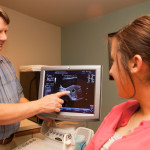Ectopic Pregnancy: What You Need To Know
Ectopic pregnancies are relatively rare here in the US, occurring in less then 2% of all pregnancies. But, because it is a serious medical condition that can be life threatening and requires immediate attention, it is something which all women should be made aware.
What is an Ectopic Pregnancy?
The simple answer is that it is a pregnancy that has implanted and is growing where it shouldn’t be. In a typical pregnancy, the fertilized egg implants in the woman’s uterus. For those experiencing an ectopic pregnancy, the implantation occurs often times in the fallopian tube, but it can also occur in the ovary, cervix or the abdominal cavity in some cases. When the implantation occurs in the fallopian tube, the most common place for an ectopic pregnancy, it is also known as a tubal pregnancy.
How does an Ectopic Pregnancy Occur?
The ectopic pregnancy occurs when the fertilized egg implants in the wrong place, but why it occurs is usually unknown. There are some things that make women more likely to have an ectopic pregnancy such as a previous ectopic pregnancy, if she’s had a pelvic infection, if she get’s pregnant while using an IUD, has had an infection in the fallopian tubes, has had certain STDs such as gonorrhea or chlamydia, or has had a tubal ligation. Unfortunately there is nothing you can do to prevent an ectopic pregnancy.
How Will I Know If I Have An Ectopic Pregnancy?
There are some symptoms that may indicate you have a tubal pregnancy. If you are pregnant and have severe pain on one side of your abdomen or pelvis, experience light-headedness or dizziness, you have an extremely low blood pressure, or pass tissue (not just blood and clots) from your vagina it can be a signal of an ectopic pregnancy. You also may or may not experience bleeding. While these are all possible symptoms of a tubal pregnancy, your doctor will want to perform a few tests to confirm that it is indeed an ectopic pregnancy. Your doctor may run some blood tests as well as a pregnancy test, and conduct a pelvic exam. They will also most likely give you an ultrasound to determine if a the pregnancy is located outside the uterus. This is important – if you think you might have an ectopic pregnancy, you should seek immediate medical attention, either from your physician or the emergency room. A tubal pregnancy is a medical situation that needs immediate attention and diagnosis. We’re not trying to scare you, but not getting medical attention can result in abdominal bleeding from a ruptured organ, causing a patient to loose blood pressure and potentially die. At PRC, if you receive an ultrasound and we discover an ectopic pregnancy, we will assist you with finding medical treatment right away and provide you with the information and paperwork you would need to take to the hospital.
What Happens If It Is An Ectopic Pregnancy?
If a fertilized egg implants somewhere other than the uterus, it can’t survive, and it can’t be relocated. When this happens, the woman’s life is at risk and the pregnancy must be terminated. Occasionally, in the case of a tubal pregnancy, the fallopian tube will need to be removed as well through surgery. If the ectopic pregnancy is caught early, the termination can be done through medication, allowing the body to absorb the tissue with no surgery. If not caught early, surgery may be required. Unfortunately, once it is confirmed that the pregnancy is ectopic, you should be advised that terminating the pregnancy is the only option for survival.
What Should I Expect After An Ectopic Pregnancy?
Each woman’s experience is different. It is not uncommon for women to experience a wide range of emotions, including relief, guilt, and loss. These are all normal feelings even if the pregnancy was unplanned and you weren’t sure if you were going to carry your baby to term. We would encourage you to find someone to talk to who can help you process your feelings. We would love to be there for you and those near you who may also be struggling with their feelings. If we can help, please give us a call and set up an appointment.

















